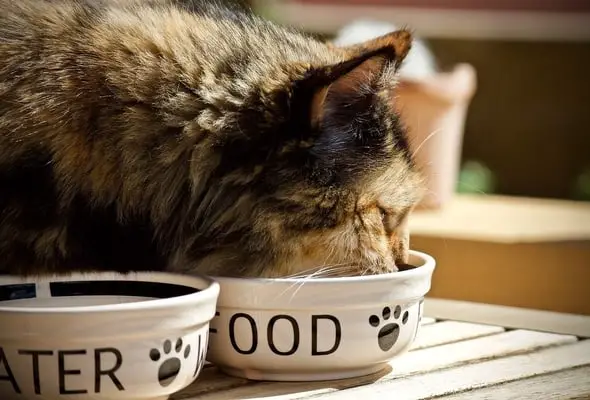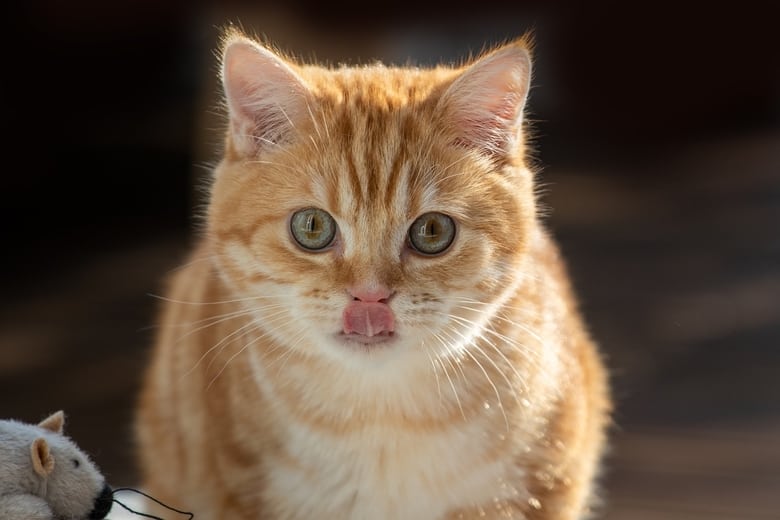If you’ve ever browsed the pet aisle of a supermarket, you may have noticed that the labels on cat food will often designate a product as either for kittens or adult cats, and only sometimes as suitable for both. It’s normal to wonder why that distinction is there, and if it’s possible for kittens to eat adult cat food and vice versa. If kittens are just baby cats, shouldn’t they be able to eat the same thing? Can kittens eat adult cat food?
Can Kittens Eat Adult Cat Food?
Kittens have different nutritional needs than adult cats. While not toxic for kittens to eat adult cat food, kittens should not be given adult cat food as their primary food source, since it lacks nutrients essential to your kitten’s development.
However, just know that it is not the end of the world if your kitten eats adult cat food by mistake. A meal or two of adult cat food will not make much of a difference.
The potential harm of feeding your kitten adult cat food comes from regular consumption, and will only be observable over time from the overall health of your kitten.
For the same reasons you should not feed adult cat food to your kitten, you should also not feed kitten food to your adult cat. However, just as adult cat food is not toxic to kittens, kitten food is also not toxic to adult cats. Being in different stages of their lives, both kittens and cats just have different needs and requirements to ensure their health and wellbeing.
To explain, we’ll go into the different nutritional needs of cats and kittens, as well as the downsides of providing the incorrect food.
Why Do Kittens Need to Eat Kitten Food?
To simplify things, consider the diets of adult humans and human babies. Human babies subsist mainly on milk or formula.
Whole milk may provide all the essential nutrients to help a human baby grow, but consuming milk as a primary food source is both unsustainable and unhealthy for adult humans and may lead to health problems. By the same token, we know that human babies should not eat adult human food. The same is true for cats and kittens.
Like human infants, kittens develop rather quickly, and their bodies double in size over a short period of time. To support this growth, kittens require nutrient rich and nutrient dense fatty foods that provide the building blocks for their development.
Nutrient density is key as a kitten needs to put on an astounding amount of weight relative to its small size. A kitten’s stomach can only hold so much food, so the food it consumes has to pack in as many calories, fats, and nutrients as possible in order to facilitate this growth.
To this end, kitten food has been engineered to meet the demands of a kitten’s development and is therefore incredibly dense. For this reason, it is the best and appropriate source of food for your kitten.
Why Should Kittens Not Eat Adult Cat Food?
Adult cat food not only lacks certain nutrients essential to a kitten’s development, it also has different ratios of those same nutrients. Cats are not fed the same nutrient dense foods as kittens because they do not need to put on weight quickly.
Adult cat food is engineered to help cats stay at a stable and consistent weight, providing them with just enough calories to replace those that they burn through normal activity.
Because adult cat food is considerably less nutrient dense, that means a kitten would have to eat considerably more of it to receive the same quantities of nutrients it receives from a smaller portion of kitten food.
This presents an obvious issue. As we’ve pointed out before, a kitten’s stomach is relatively small. This means that a kitten cannot possibly eat enough adult cat food in a day to meet its body’s demands.
What Happens When a Kitten Eats Cat Food?
By feeding your kitten adult cat food on a regular basis, you’re depriving your kitten of the building blocks of its growth while taking up valuable real estate in its stomach.
This not only deprives your kitten of the fuel it needs to grow larger, but also withholds the proteins and fats it requires to develop and grow its coat, organs, bones, and teeth.
Even though a kitten fed on a diet of adult cat food will still grow and develop, the long term negative effects of such a diet and possible malnutrition will manifest later down the line. Kittens fed exclusively on adult cat food tend to become obese, suffer organ diseases, and suffer overall ill-health.
Can Adult Cats Eat Kitten Food?
To go back to our original comparison with humans, an adult human who consumes exclusively dairy products is at a higher risk of heart disease and obesity.

This is due largely to the fact that an adult human does not continue to grow past a certain age, and so should not exclusively consume food that is intended to help pack on pounds quickly. This is also true for adult cats.
In much the same way that a kitten’s small stomach requires small portions of nutrient dense food, an adult cat’s stomach needs larger portions of less nutrient dense food.
While a cup of kitten food and a cup of adult cat food may look the same and take up the same volume, they do not provide equal benefits to your adult cat. Much like our human adult fed on dairy, an adult cat fed on kitten food takes in far more calories than it needs to survive.
Consuming excessive calories, your cat is unlikely to be able to burn off as much as it takes in. This can result in obesity and high blood pressure in adult cats, as well as unnecessary pressure on your cat’s organs, which can lead to organ disease and other illnesses.
Conclusion
As we’ve learned, it is unwise for you to let kittens eat adult cat food. While it may not be bad for them in the short term, adult cat food cannot and does not meet the demands of your kitten’s development.
To get a better sense of the kinds of nutrients in cat/kitten food, we encourage you to go to your local pet store and examine the labels on the different products.
If you want to find out what food is optimal for your cat or kitten, speak with your veterinarian, and they should be able to inform you of what exactly your pet needs to be healthy.

